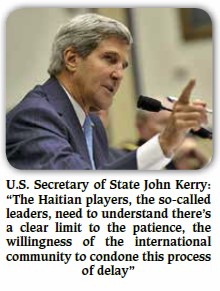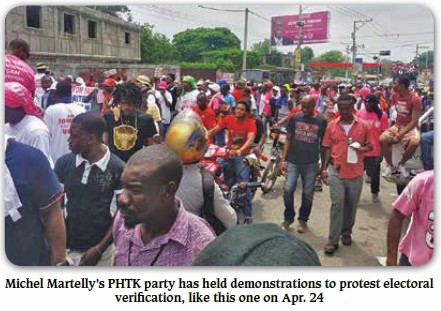|
 On Apr. 28, President Jocelerme Privert inaugurated the five-member
Independent Commission of Electoral Evaluation and
Verification. Its members are:
François Benoît,
a former member of Haiti’s Provisional Electoral Council
(2005-2006);
Gédéon Jean, a former member of the Independent
Electoral Evaluation Commission created on Dec. 22, 2015
under the Martelly regime;
Pierre Wilfrid
Sanon, designated by the Haitian Association of
Construction Companies;
Father Mc Donald
Jean, appointed by the Anglican Church (former
senator and member of the Council of the Wise in 2004);
and
Michel Eric
Gaillard, designated by the Order of Chartered
Professional Accountants of Haiti.
The new Commission has a 30-day mandate. Its
installation was boycotted by the Ambassadors of the
U.S. and its allied “Core Group” nations. Privert had to
twist the arm of his Prime Minister Enex Jean-Charles to
sign the decree forming the Commission and to attend the
inauguration. Partisans of the Haitian Bald Headed Party
(PHTK) of former President Michel Martelly have held
violent demonstrations against the Verification
Commission, breaking car windshields.The new Commission has a 30-day mandate. Its
installation was boycotted by the Ambassadors of the
U.S. and its allied “Core Group” nations. Privert had to
twist the arm of his Prime Minister Enex Jean-Charles to
sign the decree forming the Commission and to attend the
inauguration. Partisans of the Haitian Bald Headed Party
(PHTK) of former President Michel Martelly have held
violent demonstrations against the Verification
Commission, breaking car windshields.
The following edited excerpts from the Apr. 27 posting on the
Haiti Elections Blog
give the background on and lead-up to the Commission’s
installation. -
Haïti Liberté
A verification commission has been
a key demand of many civil society organizations, human
rights figures, and political parties, which for months
have called for an investigation into electoral fraud.
But the idea of verifying the vote has many powerful
opponents, from former President Michel Martelly’s PHTK
party and its allies in Parliament to the U.S. and other
Core Group countries funding Haiti’s elections.
The principal mission of
a verification commission, according to the terms
of reference submitted to Privert on Apr. 14, is “to
restore the confidence of political actors in the
electoral process by establishing the credibility of the
2015 election results.” To do so, the five-member
commission will perform an in-depth evaluation of the
vote and the prior decisions of the Electoral Litigation
Bureaus (BCED and BCEN). The commission will have 30
days to complete this task, and all the major political
parties and civil society groups will have the right to
observe its work.
Behind the scenes, the U.S. and other Core Group
countries are
reportedly demanding
the right to veto any of the verification commission’s
conclusions. During Privert’s absence from Haiti,
foreign embassies stepped up pressure on interim Prime
Minister Enex Jean-Charles and parliamentarians to amend
the commission’s terms of reference, which give the
five-person commission “the final word” on the fate of
the elections. The Core Group wants to be able to
challenge any decision by the verification panel, which
could ultimately lead to the cancellation of the
presidential vote or some legislative races, the
Miami Herald
reported. Haiti’s major aid donors have
cut off all
non-humanitarian funding to the country and have
previously suggested that funding for elections might be
cut as well if the verification process is not to their
satisfaction.
Opponents of Privert, both in Parliament and in
the streets,
stepped up their
verbal attacks on the interim president, decrying the
missed [and arbitrary] election deadline of Apr. 24 and
move toward verification as violations of the Feb. 5
accord. Former President Michel Martelly’s PHTK party
has begun aggressively mobilizing against the
verification commission. PHTK spokesperson Rudy
Hériveaux
denounced the
commission on Apr. 16 as “a manipulation attempt” solely
aimed at eliminating Jovenel Moïse from the race. On
Apr. 24, 2,000 pink-clad PHTK protesters
marched to the CEP’s
headquarters in Pétionville, calling for the final round
of elections to be held as quickly as possible, without
any verification.
Former President Martelly personally
wrote to Privert on
Apr. 15, expressing his “shock” at the country’s
inability to hold elections without international
interference and accusing the interim authorities of
attempting to make their temporary rule permanent.
Martelly accused the Privert administration of pursuing
a “broad, practically unlimited agenda that does not in
any way correspond to its mandate.” Martelly seemed
particularly concerned by a number of judicial orders
issued by public prosecutor Danton Léger concerning drug
trafficking and corruption charges against figures close
to the Tet Kale government. Martelly characterized
Léger’s initiatives as a vindictive campaign of
“de-Martelly-ization” aiming to humiliate him and his
political allies.
Intriguingly, Jude Célestin’s party LAPEH has
also expressed growing hostility towards Privert,
despite their stated support for verification. LAPEH
coordinator Jean Hector Anacasis
declared on Apr. 22
that he was suspicious of Privert’s motives: “Nothing
says that Mr. Privert will hold the elections. Nothing
says that his true motivation isn’t a tabula rasa.”
Anacasis roundly criticized the political makeup of
Privert’s administration, and openly evoked the
possibility that LAPEH supporters could soon be in the
streets alongside PHTK if elections are not held soon.
René Momplaisir, a popular organization leader who
campaigned for Célestin,
resigned from his
post as political advisor to Privert, calling the
government’s motives “obscure and incomprehensible.”
Privert and his spokespeople have shot back,
placing the blame for delays on pro-Martelly
parliamentarians who blocked the appointment of a Prime
Minister. “The accord conferred on the electoral council
the responsibility to evaluate the phases already
completed,” Privert
argued on Apr. 20.
“How can the credibility of the electoral process be
guaranteed without this verification commission? How can
the political stability of this country be guaranteed if
we don’t organize credible elections?” Privert has also
repeatedly reminded critics that only the CEP has the
power to establish an electoral calendar.
The move towards verification means Haiti’s
elections will not be held according to the deadlines
set out in the Feb. 5 political accord. Apr. 24 was the
date when the final round of elections were supposed to
be held, with the transfer of the presidential sash from
Privert to an elected successor slated for May 14.
Privert has announced that the CEP is
expected to release
the electoral calendar between May 15 and May 30, and
suggested that
elections may be held in late October, to sync up with
the expiration of one-third of the Senate. The obvious
irrelevance of the political agreement’s timetable and
the looming end of Privert’s 120-day mandate (which
expires on Jun. 14) has led to calls from some sectors
either for an extension of Privert’s mandate or for a
negotiation of a new accord.
The U.S. and its allies in the international
community, however, remain strongly opposed to both
options. While visiting Miami on Apr. 14, Secretary of
State John Kerry
warned Haiti’s
interim government that the U.S. would tolerate the
postponement of elections past Apr/ 24 only for a
“minimal period of time.”
“Let me be crystal clear,” Kerry said in an
interview. “The Haitian players, the so-called leaders,
need to understand there’s a clear limit to the
patience, the willingness of the international community
to condone this process of delay.” (Apparently unaware
of Kerry’s recent statement, a group of three U.S.
senators
wrote a letter on
Apr. 15 urging Kerry to speak out in favor of quick
elections.)
This
hardline stance was
reiterated by U.S.
Ambassador Peter Mulrean during a visit to Haiti’s
parliament on Apr. 20, accompanied by the ambassadors of
the EU, Germany, Spain, and the UK. Mulrean claimed that
the Feb. 5 accord did not call for any verification, and
said that the U.S. “fears that this commission could be
used not only for a technical verification but to pursue
a political agenda.” Mulrean met with Chamber of
Deputies President Cholzer Chancy (a Privert opponent)
and explained that the visit was motivated by a “certain
frustration” with Haiti’s political situation. In a
statement released on Apr. 25, UN Secretary-General Ban
Ki-Moon
expressed his “deep
concern” over the missed Apr. 24 elections date set out
in the accord and called for the completion of the
elections “without further delay.” While noting the
proposed verification commission, the Secretary General
emphasized “the need to conclude the process with the
required urgency.”
Popular organizations and political parties that
mobilized against electoral fraud after Oct. 25 reacted
with outrage to the international actors’ recent
statements. On Apr. 20, UNNOH, MOLEGHAF, Lakou, Cercle
Gramsci, and MODEP held a joint press conference to
denounce the
“arrogant declarations of certain diplomats and other
foreign actors.” The popular organizations decried this
foreign interference in Haiti’s domestic affairs as an
affront to national dignity, and urged Haitians not to
allow the foreign powers to impose leaders that would
serve their interests while leaving the people in
misery. “It’s the will of the people that will prevail,
and not that of foreigners,” said UNNOH’s Josué
Mérilien.
Presidential candidate Moïse Jean Charles of
Plateforme Pitit Dessalines wrote
a letter to Barack
Obama denouncing U.S. policy towards Haiti as based on a
“flawed approach.” The letter stated that the crisis had
been caused by the “complacency or complicity” of the
international powers regarding Martelly’s corruption and
his attempt to steal the elections. Jean-Charles, who
finished in third place according to the current
results, later
said that Privert
should have already kicked out the foreign ambassadors
for making such declarations, according to Radio
Kiskeya. Serge Jean-Louis, leader of Mouvement
patriotique populaire dessalinien (MOPOD),
argued that the
international community’s stance raised doubts about its
role in the controversial 2015 elections.
One of the few voices among the international
community in favor of verification is Sir Ronald
Sanders. Even while expressing scepticism about scale of
the fraud alleged in the Oct. 25 elections, the Antiguan
diplomat has nonetheless
argued
that
verifying the vote is absolutely necessary.. “The reason
for my conviction is precisely because there is a
widespread and overwhelming belief in Haiti that the
first-round elections were seriously flawed.” Drawing on
his experience leading an OAS mission to Haiti tasked
with facilitating a negotiated solution to electoral
crisis, Sanders explained: “Among the over 50 groups
with whom my team and I interfaced in Haiti in February,
all except Martelly’s Parti Haïtien Tet Kale (PHTK)
party, expressed concern; some stronger than others, but
none without misgivings.”
“If Jovenel Moïse and Jude Célestin ... have
faith in their electability, they should have no fear of
verification,” Sanders observed.
Sanders urged the international community to give
Haiti’s interim authorities the time and resources it
needs to conduct a credible verification. Without a
verification, Sanders worried, the elections would
inevitably produce a president lacking the legitimacy
necessary to govern.
“There can be no ‘quick fix’ in Haiti. Indeed, it is the
urge for quick fixes in the past, and the desire to wash
hands of the country, that has kept it in constant
turmoil and retarded its chances for long-term political
stability and economic growth,” he said.
|